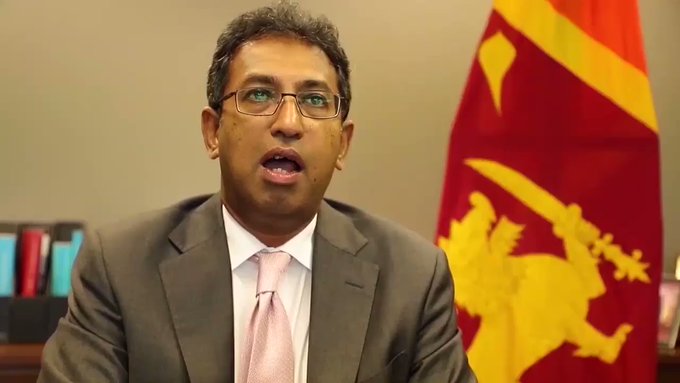In a press conference held recently at the Leader of the Opposition’s office, Member of Parliament, Dr. Harsha de Silva provided crucial insights into the current state of Sri Lanka’s economy. Central to the discussion were key developments surrounding the International Monetary Fund (IMF), challenges faced by the nation, and the imperative need for global collaboration.
IMF’s Decision Looms Large
The looming decision by the IMF board on the second tranche for Sri Lanka, slated for December 12, takes center stage in the economic narrative. MP Harsha expressed optimism about securing the tranche but sounded a cautionary note, stressing that a comprehensive vision and strategy to address the nation’s debt are imperative.
A Call for Global Unity
A recurring theme throughout the conference was the acknowledgment that Sri Lanka cannot extricate itself from economic challenges in isolation. MP Harsha underscored the necessity of collaborative efforts with other nations to navigate the economic fallout left by the Rajapaksha administrations.
IMF’s Vital Role
In emphasizing the international dimension, the Member of Parliament highlighted the pivotal role played by the IMF in sustaining agreements with other nations. The global credibility of these agreements, according to MP Harsha, is intrinsically tied to the involvement of the IMF.
Unveiling the Real Issues
The core issue behind Sri Lanka’s economic collapse extends beyond mere sustainability or cash flow challenges. To illustrate, envision running a business that falls short of expected revenue; one might consider taking out a bridging loan from a bank to maintain operations.
However, if the business crumbles due to underlying issues like corrupt administration or flawed strategies, relying solely on bridging loans becomes futile without implementing substantial reforms. This analogy mirrors the predicament facing Sri Lanka.
Debunking Misconceptions
Some political parties misconstrue the problem, viewing it solely as a liquidity issue. Their proposed solution involves only negotiating with countries like China and India to defer debt payments, omitting the need for profound economic and social reforms. Such a perspective is profoundly mistaken as Sri Lanka is facing a more complex solvency issue.
Therefore, those genuinely concerned about the country’s well-being must commit to deep reforms to get the economy back into shape. In the view of many, including MP Harsha de Silva, this represents the most viable and imperative course of action.
Lessons from Economic Summit
Drawing insights from the recently concluded Sri Lanka Economic Summit, MP Harsha highlighted the presence of Dr. Montek Singh Alhuwahlia, former deputy chairman of India’s planning commission. The reference highlighted the enduring impact of consistent reforms, linking nations to the global arena and fostering economic growth, irrespective of the political
party in authority.
Odious Debt and Global Norms
During the Economic Summit, he mentioned that a representative from a certain political party made reference to the need to pursue cases of odious debt as a means to relieve the country of burdensome liabilities. He asserted that such statements only go to damage the confidence of
the country and that Sri Lanka must fulfill their debtor obligations to participate and maintain a standing in global international markets.
Building Confidence Through Dialogue
MP Harsha stressed the vital importance of ongoing discussions with creditors in rebuilding confidence and trust on the international stage. Such engagements, according to him, are essential for Sri Lanka’s resurgence on the global economic landscape. MP Harsha cautioned against statements detrimental to building trust and confidence with global markets. Such
rhetoric, he argued, could impede Sri Lanka’s ability to conduct business on the world stage.
SJB’s Vision for Economic Progress
Advocating for the Samagi Jana Balawegaya’s (SJB) approach, MP Harsha championed the need to build bridges rather than walls around Sri Lanka. The focus, he emphasized, should be on developing an export-led economy, diverging from import-substitution and protectionist policies proposed by other parties.
FDIs as a Cornerstone
The fundamental factors driving production—land, labor, capital, and entrepreneurship—are crucial elements in any country’s economic equation. However, he asserted our challenge lies in the scarcity of capital, primarily due to low savings.
Therefore, it becomes imperative to boost foreign direct investments (FDIs) in Sri Lanka to propel our economic progress. Achieving this, however, necessitates a delicate balance. We must pursue increased FDIs without undermining the confidence and trust in global markets.
Instead, our focus should be on strengthening these aspects to attract more foreign investments, contributing to the sustainable development of our nation. This he stressed can not be achieved without major overhauls in trade and investment policy, which most political parties are unwilling to undertake.
Long-Term Vision and Progressive Reforms
In concluding remarks, MP Harsha reiterated the importance of implementing drastic progressive economic reforms. He acknowledged that building a resilient economy is a gradual process, requiring a sustained commitment to long-term vision and strategic initiatives.
In essence, MP Harsha de Silva’s comprehensive address provides a roadmap for Sri Lanka, urging a holistic and collaborative approach to navigate the complex economic challenges and forge a path toward sustainable growth and prosperity.
Source : Lanka Business Online


